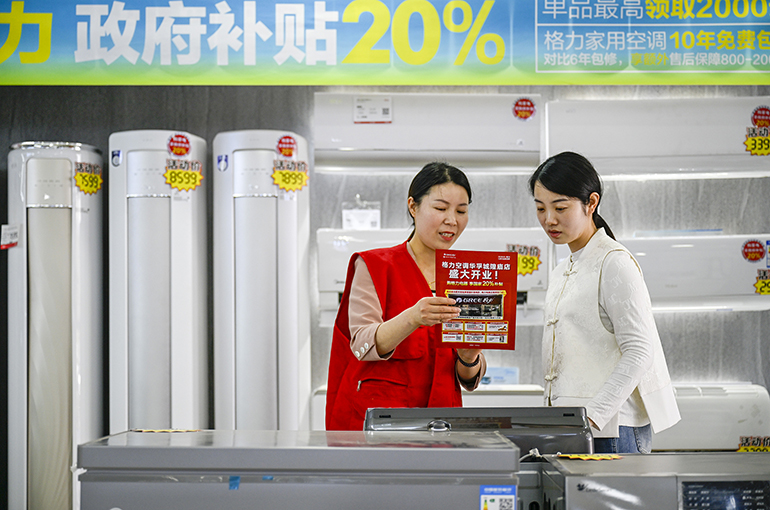 China’s Consumer Goods Trade-In Subsidies Run Dry Amid Spending Surge
China’s Consumer Goods Trade-In Subsidies Run Dry Amid Spending Surge(Yicai) June 19 -- China’s consumer goods trade-in program, which offers subsidies to consumers who replace old products with new ones, has been such a success this year, thanks in part to a major mid-year online shopping festival, that many parts of the country have already exhausted their allocated funds and are now waiting for additional support from the central government.
Guangxi Zhuang Autonomous Region in southern China will temporarily suspend its subsidy program for replacing old cars, home appliances, digital gadgets, e-bikes and home renovation products from midnight on June 20, the Guangxi Daily reported today, citing the local commerce department. Customers should wait for an official announcement that will inform them when the subsidies will resume.
Xinjiang Uyghur Autonomous Region, in the northwest of the country, stopped its trade-in program on June 15. Meanwhile, people living in other places such as the southwestern municipality of Chongqing, eastern Jiangsu province and central Hubei province have also taken to the internet to complain that they have not been able to claim their local subsidies recently.
The consumer goods trade-in program, which was rolled out by the Chinese government last year, was expanded this year to cover digital products such as smartphones and tablets. The central government also doubled its funding this year to CNY300 billion (USD41.7 billion) from last year’s CNY150 billion.
The funds come from ultra-long-term special treasury bonds issued by the Ministry of Finance and are being handed out to local governments in batches, according to arrangements made by the State Council. So far this year, two rounds of funding amounting to CNY81 billion (USD11.3 billion) were dispatched in both January and April. The remaining CNY138 billion (USD19.1 billion) is expected to be distributed in the third and fourth quarters.
To boost spending, local governments have been heavily promoting these subsidies this year and making it easier for people to claim them. These efforts, combined with the early launch of the 618 shopping festival by e-commerce platforms in May, have caused subsidy funds to run out faster than expected.
The promotion is having a notable impact on sales. In May, China’s total retail sales of consumer goods jumped 6.4 percent from the same time last year to CNY4.1 trillion (USD570.3 billion), according to recent data from the National Bureau of Statistics. This was a widening of 1.3 percentage points from April.
Sales of home appliances and communication devices saw especially big increases, surging 53 percent and 33 percent, respectively, driven by both government subsidies and the 618 promotions. These growth rates accelerated by 14 percentage points and 13 percentage points, respectively, compared to April.
Editor: Kim Taylor